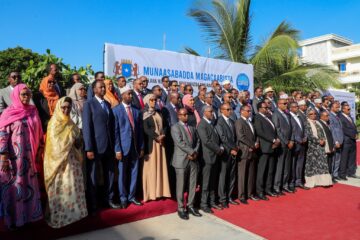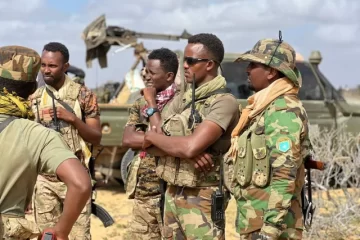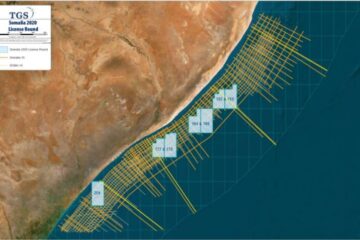What’s the Objective of President HSM’s Foreign Visits?

Mohamud has so far visited 7 countries since assuming country’s presidency
Since his election victory on May 15, President Hassan Sheikh Mohamud, widely known as HSM, has traveled to seven countries, the latest being Egypt. His previous visits were to the United Arab Emirates (UAE), Turkey, Djibouti, Eritrea, Kenya, Djibouti, and Tanzania. He’s also expected to visit Ethiopia soon. So, what is the objective of president HSM’s visits to these countries early in his term, and even before forming his cabinet?
There are a number of plausible objectives to these trips to the Horn of Africa and Middle East region—the two regions that Somalia is most connected to in cultural, historical and trading terms.
Mending ruptured ties
Somalia’s relations with some of its neighbors and allies such as Kenya, the UAE and Djibouti were damaged during the reign of former president Mohamed Abdullahi Farmaajo over a number of issues. Ties between Somalia and Kenya have been turbulent under Farmajo over political and geostrategic issues. As for the UAE, the Gulf country accused Somalia of siding with Qatar during the 2017 Gulf crisis while Mogadishu accused Abu Dhabi of bypassing it in its dealings with some of the country’s federal member states and encouraging unrest. During his campaign for the presidency, Mohamud vowed to reconcile Somalis and to pursue a zero-problem foreign policy. This was epitomized by his campaign motto “Soomaali heshiis ah dunidana heshiis la ah,” which translates to “Somalia at peace with itself and with the world.”
Security cooperation
President Mohamud has made it clear that security will be his administration’s number one priority. In his recent piece to The Economist, the Somali leader pledged to liberate Somalia from Al-Shabaab and called for more international support to militarily and ideologically defeat the group. Hence, this explains the reasons behind some of his visits. Most of these countries are key security partners. Some like Turkey and Eritrea are training Somali soldiers, while Kenya and Djibouti are major troop-contributing countries to African Union Transition Mission in Somalia (ATMIS). On the other hand, Mogadishu and Nairobi agreed to reactivate the Joint Cooperation Committee (JCC) which will see the two countries conduct joint security and defense activities, share intelligence, and increase bilateral trade among others.
Drought response
Somalia is facing its most severe drought in 40 years with around half of its population in need of food assistance. A key priority of Mohamud’s visits abroad is to rally international support for drought response and the president has raised the issue during his meetings with his counterparts. The recurring nature of the droughts has caused donor fatigue while other emerging crises in other parts of the world such as the war in Ukraine have drawn international attention away from Somalia. During his visit to Nairobi, Mohamud agreed with his Kenyan counterpart Uhuru Kenyatta to “collaborate with other regional and international actors to provide the much-needed humanitarian assistance to mitigate the effects of the current drought in the Horn of Africa region.”
Trade
Trade has also been one of the top agendas for President Mohamud during his travels abroad. Mohamud has also agreed with Kenyatta to allow the resumption of khat exports to Somalia, the reopening of the border between the two neighboring countries in order to facilitate the free movement of people and enhance trade in goods and services, and to ease visa restrictions among others. Moreover, the two presidents have directed the immediate market access of fish and fish products from Somalia to Kenya and vice versa. Agreements to cooperate on trade were also signed with other countries like Turkey, UAE and Egypt. During his participation as a guest in the East African Community (EAC) Heads of States summit in Arusha, Tanzania, Mohamud successfully convinced the leaders to fast-track the verification of Somalia’s application to join the bloc. “Somalia belongs to East Africa,” President said in his address at the summit. “There is no country among the seven countries sitting here that Somalia is not linked to by business, by community or by any other means.” This indicates Mohamud’s keenness to foster trade between Somalia and the countries in the region.
Other takeaways
President Mohamud’s quest to repair and improve relations with countries in the region and beyond has not gone without criticism. For instance, the deals Somalia signed with Kenya have been seen as largely benefitting the latter especially when it comes to the resumption of khat trade. Kenyatta is supporting former Prime Minister Raila Odinga for the country’s presidency ahead of general elections in August and the khat deal is seen as key in securing votes from the Meru, a community that largely depends on khat export. Moreover, Mohamud was expected to convince Kenya to officially recognize the maritime delimitation reached last October by the UN’s highest court, the International Justice Court, which was largely in favor of Somalia.
Mohamud is also yet to visit Ethiopia, a strong ally of the Farmaajo administration, and his trip to Egypt has raised concerns among analysts that the Somali leader might ire Addis Ababa whose relations with Cairo have been strained over the Nile dam dispute. Egyptian President Abdel-Fattah El-Sisi’s remarks during his press conference with HSM that he shared views with his Somali counterpart “on the danger of the unilateral policies” in reference to the Grand Ethiopian Renaissance Dam (GERD) indicates Egypt’s immediate priorities in its relations with Somalia. It remains to be seen whether Somalia will abandon its years-long neutral stance on the row between the two countries. On the other hand, Somalia might leverage its relations with Egypt against Ethiopia, a dominant player in the Horn of Africa and a historical rival of Somalia.








